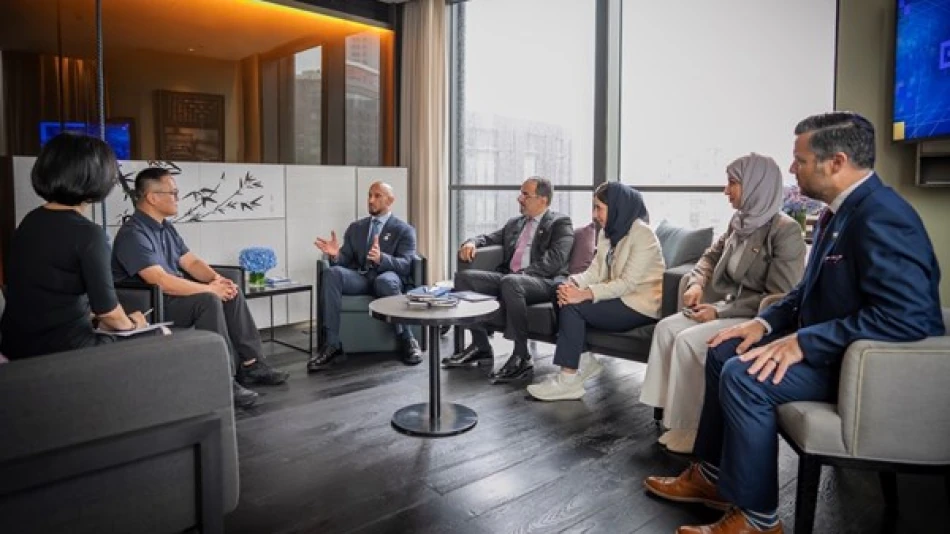
Leading Media and Tech Figures Meet with Abdullah Al Hamed in Shanghai
UAE Media Chief Courts Chinese Tech Giants in Strategic Push for Digital Dominance
The UAE is accelerating its digital media transformation through high-level partnerships with Chinese technology leaders, as the Emirates positions itself as a global hub for AI-powered content creation and smart infrastructure. Abdullah bin Mohammed bin Butti Al Hamed, head of the UAE's National Media Office, conducted strategic meetings in Shanghai with executives from companies specializing in artificial intelligence, creative investment, and digital broadcasting—signaling Abu Dhabi's intent to compete directly with Singapore and Hong Kong as the region's tech-media nexus.
Bridge 2025: Abu Dhabi's Bid for Global Media Leadership
These Shanghai discussions serve as groundwork for the Bridge 2025 summit, scheduled for December 8-10, 2025, in Abu Dhabi. The timing is strategic—as global media companies reassess their Middle Eastern strategies amid shifting geopolitical dynamics and the region's growing consumer spending power.
Al Hamed emphasized the UAE's commitment to building partnerships that enhance the country's global media standing while supporting "responsible content creation" that aligns with leadership vision for "influential, conscious, and innovative media."
What This Means for Investors
The UAE's approach mirrors Singapore's successful model of attracting international tech giants through favorable regulations and strategic partnerships. For media and technology investors, this signals several opportunities: the Emirates is likely preparing new incentive packages for digital content creators, AI development firms, and smart city infrastructure providers.
Chinese Tech Integration: Beyond Traditional Partnerships
The meetings included executives from seven major Chinese firms, each representing different facets of the digital economy transformation the UAE seeks to accelerate.
AI and Big Data Focus
Chi Zhao Pan, founder of Beijing Easy Time, brings expertise in digital technology, artificial intelligence, big data, and 5G networks—areas where the UAE has already invested heavily through initiatives like the Mohammed bin Rashid Innovation Fund. This partnership could accelerate the Emirates' smart city projects beyond Dubai and Abu Dhabi into smaller emirates.
Creative Capital and Content Creation
John Darling's Creative Capital Investment specializes in supporting startups across media, entertainment, and technology sectors. His involvement suggests the UAE is building a comprehensive ecosystem rather than simply importing technology—a more sustainable approach than the tech hub strategies attempted by other Gulf states.
Strategic Timing in a Shifting Global Landscape
These partnerships come as Western tech companies face increasing scrutiny in China, while Chinese firms seek new markets for expansion. The UAE's neutral diplomatic stance and business-friendly environment make it an attractive intermediary for Chinese companies wanting to access Middle Eastern and African markets.
Smart Infrastructure as Competitive Advantage
The inclusion of TGD Parking Sonsia, which provides AI-powered smart parking solutions, indicates the UAE's focus on practical applications that enhance quality of life—a key differentiator from other regional tech hubs that prioritize flashy projects over functional infrastructure.
Market Implications and Regional Competition
This Chinese partnership strategy positions the UAE ahead of Saudi Arabia's NEOM project and Qatar's digital ambitions. While those initiatives focus on building from scratch, the UAE is leveraging existing infrastructure and international relationships to create immediate value.
For global media companies, the UAE's approach offers a tested pathway into Middle Eastern markets through partnerships with proven Chinese technology providers, potentially reducing both costs and risks compared to independent market entry strategies.
The Education Technology Angle
Julien Liang's Squirrel AI specializes in smart education—a sector where the UAE has struggled to achieve the same success as its financial and tourism industries. Chinese expertise in educational technology could help the Emirates develop a knowledge economy that reduces its dependence on oil revenues and foreign expertise.
The broader significance: These Shanghai meetings represent more than technology transfer—they signal the UAE's evolution from a regional business hub to a global platform for East-West collaboration in the digital age, with implications for how other Gulf states approach their own digital transformation strategies.
Most Viewed News

 Layla Al Mansoori
Layla Al Mansoori






